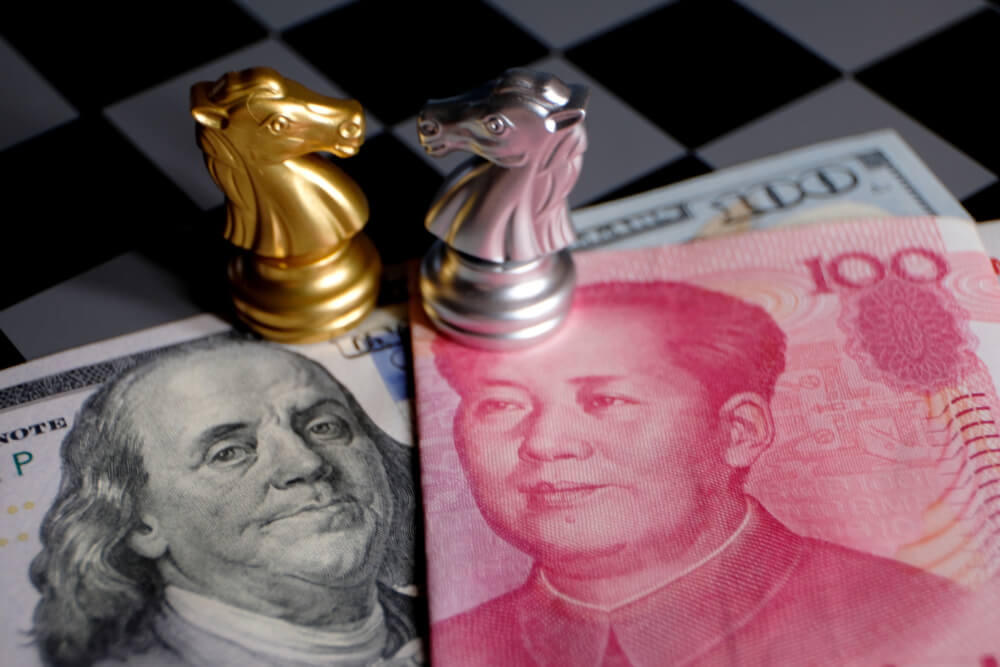China stabilized its currency Tuesday, suggesting it might hold off from aggressively letting the yuan weaken as a way to respond to U.S. President Donald Trump’s tariffs, in a trade war that is wounding the world economy.
The yuan declined to 7.0562 to the dollar before strengthening back to 7.0297 in the afternoon. That came a day after Beijing sent financial markets tumbling by allowing the currency to fall to an 11-year low. A weaker yuan can help neutralize U.S. tariffs on Chinese goods by making them more price-competitive on international markets.
The Trump administration responded Monday by officially declaring that China improperly manipulates the yuan’s value. That opens the way to possible new penalties on top of tariff hikes already imposed on Chinese goods in a fight over Beijing’s trade surplus and technology policies.
The sight of the world’s two economies engaging in a tit-for-tat economic dispute has shaken investors. So the fact that China let its currency stabilize on Tuesday offered some hope that the sides might try to keep the situation from escalating further. Stock markets turned higher.
The Chinese central bank governor, Yi Gang, tried to reassure markets, promising in a statement late Monday “not to use exchange rates for competitive purposes.”
The central bank is “committed to maintaining the basic stability” of the yuan “at a reasonable and balanced level,” Yi said.
But relations remain tense between the U.S. and China, which have engaged intermittently in talks to address Trump’s complaints that China does not trade fairly.
Trump rattled investors with last week’s surprise announcement of punitive tariffs on an additional $300 billion of Chinese imports, effective Sept. 1. That came after a round of talks on resolving their tariff war ended in Shanghai with no indication of a deal.
The ruling Communist Party’s main newspaper accused Washington of “deliberately destroying the rules-based international order” and jeopardizing economic cooperation. It accused the Trump administration of using American families as hostages in trade talks, since tariffs on imports tend to increase a country’s consumer prices at home.
“One cannot understand how such a big, internationally influential country could be so irresponsible,” the People’s Daily said.
The Chinese central bank denied improperly manipulating the exchange rate. It said the yuan’s decline was driven by market forces.
“The latest U.S. move will likely harden China’s position in trade negotiations,” Tao Wang, an analyst at UBS bank, said in a report.
American officials complain that a weak yuan — also known as the renminbi, or “people’s money” — makes China’s export prices unfairly low, hurting foreign competitors and swelling Beijing’s trade surplus.
Washington’s latest moves may be “evidence that the U.S. administration may not really want to reach a trade deal soon,” said Wang. “We believe there is an increasing risk to a delay or cancellation of the planned trade talks.”
Asian stock markets fell for a second day. China’s main index lost 1.6% and Australia’s was down 2.4%. But markets edged back up in Europe, where Germany’s DAX was up 0.3%, while U.S. futures were almost 1% higher.
The People’s Bank of China sets the exchange rate each morning and allows the yuan to fluctuate by 2% against the dollar during the day. The central bank can buy or sell currency — or order commercial banks to do so — to dampen price movements.
On Tuesday, the yuan’s starting exchange rate was set at 6.9683. That would allow the currency to weaken to as much as 7.100 while staying within the 2% trading band.
Chinese regulators are trying to make the state-controlled exchange rate more responsive to market forces, which are pushing the yuan lower.
Trump’s tariff hikes have put downward pressure on the yuan by fueling fears that economic growth might weaken.
The yuan has lost 5% against the dollar since hitting a high in February of 6.6862 to the dollar.
That helps exporters cope with tariffs of up to 25% imposed by Trump on billions of dollars of Chinese goods. But it raises the risk of inflaming American complaints.
A weaker yuan also might disrupt Chinese efforts to shore up cooling economic growth. It would raise borrowing costs by encouraging an outflow of capital from the world’s second-largest economy.
© The Associated Press. All rights reserved.
